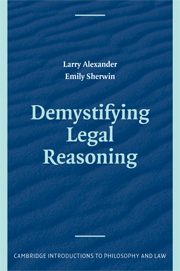Book contents
- Frontmatter
- Contents
- Introduction
- PART ONE Law and Its Function
- PART TWO Common-Law Reasoning: Deciding Cases When Prior Judicial Decisions Determine the Law
- PART THREE Reasoning from Canonical Legal Texts
- V Interpreting Statutes and Other Posited Rules
- VI Infelicities of the Intended Meaning of Canonical Texts and Norms Constraining Interpretation
- VII Nonintentionalist Interpretation
- VIII Is Constitutional Interpretation Different? Why It Isn't and Is
- Epilogue: All or Nothing
- Selected Bibliography
- Index
- References
VI - Infelicities of the Intended Meaning of Canonical Texts and Norms Constraining Interpretation
Published online by Cambridge University Press: 05 June 2012
- Frontmatter
- Contents
- Introduction
- PART ONE Law and Its Function
- PART TWO Common-Law Reasoning: Deciding Cases When Prior Judicial Decisions Determine the Law
- PART THREE Reasoning from Canonical Legal Texts
- V Interpreting Statutes and Other Posited Rules
- VI Infelicities of the Intended Meaning of Canonical Texts and Norms Constraining Interpretation
- VII Nonintentionalist Interpretation
- VIII Is Constitutional Interpretation Different? Why It Isn't and Is
- Epilogue: All or Nothing
- Selected Bibliography
- Index
- References
Summary
In this chapter we take up three ways that the rule maker's intended meanings of his rules may turn out to be problematic. First, the intended meanings could be problematic as a normative matter because of their content. The rule maker may actually intend a meaning that is absurd, unjust, or quite anachronistic (and thereby absurd, unjust, or pointless). Second, the rule maker's intended meaning may be utterly opaque. The intended meaning of the rule in general may be opaque. More likely, that intended meaning is opaque in particular circumstances of application. Third, and a point much emphasized in criticism of intentionalist approaches such as ours, the rule maker may be a multimember institution such as a legislature, a multimember court, or an administrative board; and it may be the case that there is no single intended meaning endorsed by enough members to enact that meaning as law. We take up in turn these three problems with equating the meaning of a canonical legal text with the rule maker's intended meaning for that text.
Absurd, Unjust, and Pointless Intended Meanings
There is no doubt that, on occasions, even the best rule maker will promulgate a canonical legal text, the intended meaning of which will be absurd, unjust, or pointless. This is not an embarrassment for our position on interpretation of canonical legal texts – far from it.
- Type
- Chapter
- Information
- Demystifying Legal Reasoning , pp. 167 - 190Publisher: Cambridge University PressPrint publication year: 2008

